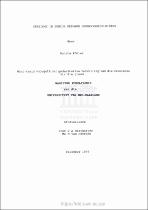| dc.description.abstract | To achieve the goals of democracy, equality and justice it becomes importants to recognize teachers and students as individuals in their own right.. The promoters of change expect of teachers to take a critical look at their own teachi.ng and to reflect critically on their actions in order to achieve the above-mentioned ideals. Through critical' self-reflection I discovered a passivity amongst the Junior Primary students whom f teach at the BellvilIe College of Education. My initial plan was to try and encourage these students to participate more actively during lessons, At the same time I planned to point out to them the role they play within their own oppression and I also planned to discuss ways
of dealing with the problem. I saw emancipatory action research as a possible way of dealing with the said problem. The reasons for choosing action research are: firstly, because action research aims to assist teachers to understand their own practices in order to change or transform them; and secondly, because action research encourages participants to participate actively in the process of change. During my first action research project which I initiated to involve students to a larger extent, I discovered that I was not merely dealing with a passive group of female students but that these students find themselves, as is the case with women in society generally, $riE.hin a social system $rhj-ch treats them as "second-class citizens" and encourages sexist practices. I began to realize that the problem I was trying to solve was
more complex than I anticipated at the start.. For this reason It started questioning the sexist practices we as women are confronted with daily. As my own awareness of this particular problem grew, my action research projects started developing in another direction. Apart from the fact that. emancipatory action research can be seen as a method to expose repressive or oppressive practices, it can also be viewed as a way of improving or changing an oppressive situation. | en_US |

